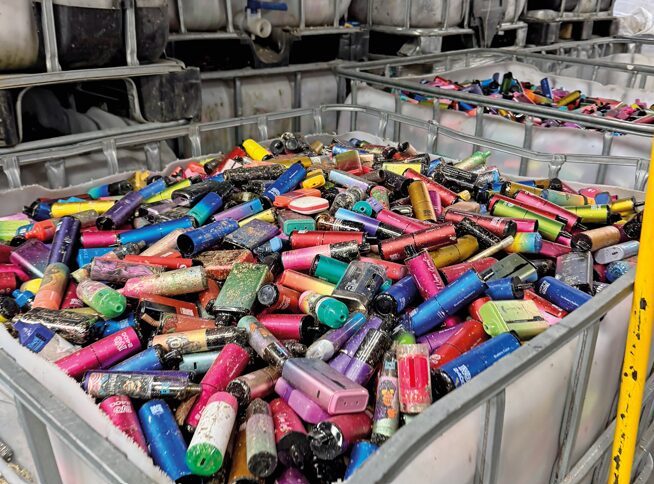Disposable vapes recycled from convenience stores are being illegally resold overseas, while some recycling bins are being used as dumping spots for hazardous drug paraphernalia.
According to a senior vaping-industry whistleblower, some retailers trying to comply with mandatory vape-recycling legislation were unknowingly supplying a recycling black market. Exposing this hidden dark side to Better Retailing, the industry insider said: “We found out recently there are various companies exporting disposables to Africa for reuse. It’s unbelievable, but some will happily consume a disposable vape that’s been used.
“We have it on very good authority that 20 tonnes of used vapes were shipped out to Africa three months ago. They were all disposables, specifically targeted to be reused.
“Retailers are doing the right thing by having facilities for customers to recycle waste, but some of this stock is being sent abroad illegally.”
Hazardous materials found in vape recycling bins
The source, who had access to industry-wide recycling data, added that only 5% of vapes taken from recycling bins were illicit. However, they claimed some bins were being used to dump dangerous materials.
They explained: “The vape-recycling companies sometimes get used drug needles, used drug bags and sex toys. If a retailer finds a syringe or similarly dangerous material in their bin, we strongly advise them to leave it. Get in contact with your recycling provider, who can help sort it out.”
The source added there were fewer cases in retail because the bins mainly contained vapes and batteries, with public waste centres being the main hotspots for illegal materials.
The whistleblower also claimed some recycling companies were creating fire hazards by sitting on used vapes, and not processing them for disposal.
They said: “I think one of them may be building them up to increase the fees they collect.”
Retailers need to stay compliant as crackdown starts
Despite the issues around disposable-vape bins, the insider urged retailers not to ignore mandatory waste-recycling regulations ahead of increased efforts by trading standards to check compliance.
Retailers selling electrical equipment must offer recycling services for those goods under the Waste Electrical and Electronic Equipment (WEEE) regulation.
Those who have sales of less than £1,923 per week in electrical goods can qualify for the Distributor Takeback Scheme, where they help fund local-authority recycling, instead of hosting a recycling point in store.
Non-compliance could result in maximum penalties of unlimited fines.
Advising on what retailers can do to ensure they’re working with a legitimate vape recycler, the source explained there were several checks. They explained: “The illegal exports and hazards emphasise the importance of why retailers should ensure they’re using legitimate recyclers to get their waste sorted.
“Any recycling organisation must issue a quarterly return to show how much they’ve processed. This needs to be provided by law. The best entities for compliance advice are those that have well-established schemes such as Veolia, REPIC, Ecosurety and Valpak.
“They’ll have scheme managers who can give you all the advice you need for compliance, and can give you a proper timeline of any upcoming changes, whether small or big.
“They’ll have good relationships with trading standards. You want to avoid companies that have only recently been set up.”
Last month, a senior government source confirmed to Better Retailing that trading standards enforcement around WEEE is to increase.
Compliance an issue for small stores
They added small shops were mostly non-compliant due to concerns over cost, management and hygiene.
The whistleblower added: “Independent retailers are some of the worst for WEEE compliance.
“This goes from some franchises to one-man bands. I’ve never seen recycling bins in them, whereas the big chains such as BP, Co-op and Spar, do have them.
“We need to press upon retailers the importance of complying with WEEE.
“There was a company that had a fire on premises caused by a vape. The loss adjuster refused to pay out on the damage because it didn’t show diligence in reducing the risk.”
Read more Vape and Next-gen news
This article was originally published by a www.betterretailing.com . Read the Original article here. .

